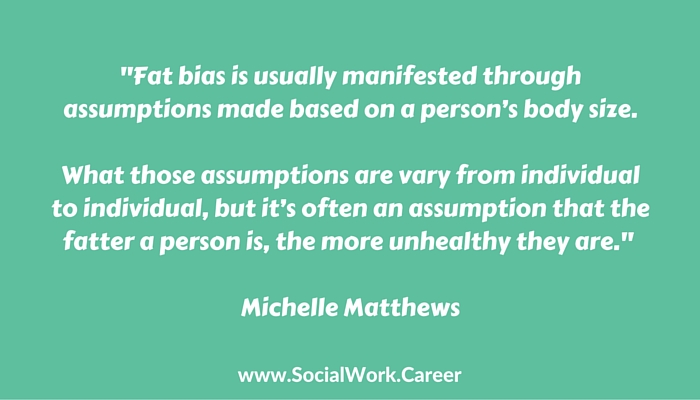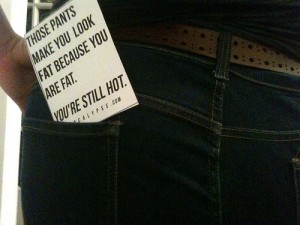 This week, I had the pleasure of interviewing Michelle Matthews, a first year social work student at NYU’s Silver School of Social Work.
This week, I had the pleasure of interviewing Michelle Matthews, a first year social work student at NYU’s Silver School of Social Work.
While Michelle is just at the beginning of her social work career, I think you will find her story quite inspiring. She is already working as an advocate at her school on the issue of fat bias. Some of you may know Michelle by her twitter handle @FatSocialWorker.
Before Michelle arrived on the scene, fat oppression was hardly recognized, much less discussed. Her most recent post An army of one on her blog The Fat Social Worker illustrates the difficult and lonely road an advocate often must take.
Without further ado, Michelle, could you describe a bit of your background (your undergraduate degree and what led you into the social work field…)?
I received my undergraduate degree from the University at Buffalo in English and gender studies. While working on my degree and before grad school, I worked as a freelance journalist. I also spent a year in AmeriCorps*VISTA working for Medicare Rights Center, a Medicare and health care advocacy organization.
I’ve also done a lot of volunteer work, which is what led me into social work. I’ve volunteered as a peer and crisis counselor for The GLBT National Help Line and The Anti-Violence Project. Both were really enriching experiences which made counseling something I wanted to do for a living.
Could you explain what you perceive as the “fat bias?”
Fat bias is usually manifested through assumptions made based on a person’s body size. What those assumptions are vary from individual to individual, but it’s often an assumption that the fatter a person is, the more unhealthy they are.
Other assumptions can be that the person is lazy, smelly, out of control of their eating, irresponsible, greedy, slow… you get the picture.
Do you have any idea of how these negative stereotypes came to be associated with being overweight?
I’m not certain what the origin of it is, but the media perpetuates these stereotypes, and always have. It’s hard to think of one positive fat representative in the media. Honestly, a lot of those negative stereotypes look pretty similar to the negative stereotypes associated with other oppressed groups. I’d say the lazy bit has a lot to do with our Puritan work ethic, but I would just be speculating.
What led you to take on the fat bias as a cause and when did you start?
I read Marilyn Wann’s Fat!So?, a seminal book on fat activism, when I was about 15. At that point in my life, I was already an activist.
I was also a vegan and involved in a lot of environmental activism, and I often noticed a lot of fat shaming in those communities that ran counter to my feminism ideals. Fat!So? helped me conceptualize that fat oppression existed.
As time went on, I gained weight. I noticed people’s perceptions of me change. I noticed my perceptions of myself change. And I’ve always been academically interested in the fat acceptance movement, but it wasn’t really until I was sitting in a NYU Silver school classroom that I realized there was work that had to be done, and I was the one who had to do it.
It was in an Ethnocultural Issues class, and there were things being said that were so triggering to me. I realized that holding preconceived notions about fat people wasn’t seen as an issue to a lot of social workers.
I started delving more into the subject matter, going to conferences, and making connections. My blog, The Fat Social Worker, is kind of a documentation of that.
It was very brave of you to take on the role of being the one to introduce this topic to the graduate social work student population at NYU during the special day of workshops offered last month.
How receptive was your school to your idea of providing a workshop on fat bias?
Well, it was kind of scary, because at the time I started this, I really felt like a new kid on the block. At the insistence of one of my professors who I’d talked to about this stuff, I reached out to student groups to give a short presentation. I started off doing that, and eventually I was offered the chance to present during Common Day, so it wasn’t actually even my idea.
That’s what I like so much about the Silver School of Social Work. There isn’t a whole lot of “upper management.” It might not seem that way while we’re in it, but NYU really does give a lot of voice to students compared to most other schools. The whole Common Day event was organized by students for students.
Has a lot of research been conducted in this arena? What are some good books/articles that you would recommend?
It’s definitely a burgeoning field, but there is a lot of good research out there. The two books I’d recommend for those interested in this topic are Weight Bias: Nature, Consequences, and Remedies [affiliate link] edited by Kelly D. Brownell, Rebecca M. Puhl, Marlene . Schwartz and Leslie Rudd, as well as The Fat Studies Reader
, [affiliate link] edited by Esther Rothblum Sondra Solovay.
If you’re more generally learning about the obesity epidemic’s role in fat bias, then I’d suggest The Obesity Myth: Why America’s Obsession with Weight is Hazardous to Your Health [affiliate link] by Paul Campos.
Those who are more interested in the topic from a clinical point of view might enjoy Health At Every Size: The Surprising Truth About Your Weight [affiliate link] by Linda Bacon or Intuitive Eating: A Revolutionary Program That Works
[affiliate link] by Evelyn Tribole and Elyse Resch.
And I have to, have to give a shout out to Marilyn Wann’s FAT!SO? : Because You Don’t Have to Apologize for Your Size? [affiliate link] which is what got me into this mess in the first place. Fat!So? is a very accessible introduction to these issues.
How do you feel that the fat bias is vs. other biases that people have to contend with such as race, gender, ethnicity and class?
I don’t like to compare biases. They affect every individual differently. Rather than comparing them, I’d like people to think about them all at once, especially when you’re dealing with a client.
A client is never just fat. A client is never just poor, never just white or Latino or black. How all these different oppressions intersect is going to inform how they experience them, and how the client experiences them is what is going to inform your work with them.
What are some suggestions that you have for social workers and other mental health professionals in order to assist clients who may be facing fat bias?
Chances are, your client isn’t going to come to you and say “I’m experiencing fat bias.” If you have a fat client who is experiencing this bias they are probably saying things like “I always diet and it never works, and I’m a failure” or “I won’t even bother asking for a raise because I don’t think I’ll get it.”
I think if we’re talking one on one work, affirmative, strength-based therapies are the way to go. But if you really want to help your clients affected by fat-bias (read: all of your clients), then you may want to consider getting involved in change on a macro level.
There is a yahoo group for those of us interested in exploring all of these issues that all clinicians and students are welcome to join called the Size Diversity Coalition of Social Workers http://health.groups.yahoo.com/group/sizediversitycoalition
When you say “all your clients are affected by fat bias,” what do you mean?
Body image issues are pervasive for everyone of all sizes. You need look no further than an anorexia support group to see that in action. The fear of being fat is real.
The HAES movement advocates “health at every size.” Do you feel that the HAES movement is something that will bring about a positive change in people’s perceptions of overweight people?
Definitely. HAES is fighting against the diet-industrial complex that keeps people buying into the idea that fat people just don’t try hard enough when the truth is most fat people are trying harder than anyone to be in shape. The HAES science shows that it’s not about effort or will… It’s about body chemistry and that size is not a reflection of health.
Finally, is there anything that you would like to add on this topic?
I think the only message I want people leaving with when I talk about this issue is the idea of assumptions. People make assumptions for a number of reasons and we make actions based on those assumptions.
As social workers, it’s our job to analyze why we make the assumptions we make. If you have a fat client who happens to have diabetes, question whether it’s really the fat on their body that is giving them that diabetes.
There are plenty of studies out there that show experiencing stigma or oppression is related to the onset of diabetes.
And once you realize there’s no way for you to conclusively know why they have diabetes, ask yourself, does this person having an illness affect my view of them? Do I think lesser of them? First of all, folks with diabetes can live long, healthful lives.
And even if they aren’t healthy, do you make a moral assumption based on that? Question your assumptions…
I had heard how oppression and poverty may lead to increased stress and various health issues but this is the first time, I’ve heard about them being related to diabetes. Could you share one of your sources?
There is no direct connection of anything with diabetes. There is no causal connection between obesity and diabetes, merely a correlational one.
However Goodman and West-Olatunji found in their study in post-Katrina New Orleans a strong correlation between experiencing systemic oppression and experiencing elevated levels of stress.
Elevated levels of stress are connected with elevated blood pressure, heart disease, hypertension, diabetes, depression, cancer, miscarriages and sexual dysfunction, which all also happen to be correlated with obesity.
Source: Goodman, R.D. & West-Olatunji, C.A. Traumatic stress, systemic oppression and resilience in post-Katrina New Orleans. Spaces for Difference: An Interdisciplinary Journal 1(2), 51-68.
Thanks so much, Michelle, for sharing with us this important information about fat bias and how we may start to work on changing our thoughts and assumptions in this regard.
As always, please feel free to ask any questions or make any comments. Your feedback is most appreciated 🙂





Very interesting interview.
Thanks so much, Casdok 🙂
Wonderful interview and its so heartening that young professionals like Michelle are introducing “radical” ideas into the field of social work, whose whole purpose it to help and heal. Go Michelle! and thanks Dorlee sharing with us!
This is a very important post, in my opinion.
The topic of assumptions and actions based upon those assumptions, is so crucial to all of us. I hope that we will start teaching young children how to question and have an awareness of their own assumptions. Surely it effects how we humans operate in the world – even on a political basis.
I know I try my best to pay attention to my own assumptions when they are at work. They can be so subtle and complex and powerful.
Michelle’s comment: “A client is never just fat. A client is never just poor, never just white or Latino or black. How all these different oppressions intersect is going to inform how they experience them, and how the client experiences them is what is going to inform your work with them” was very profound. I will be thinking about this.
Thanks for raising this issue. And thanks to Michelle for all the courageous work she is doing.
Thanks so much for your kind feedback, Elizabeth and Terry 🙂
And yes, I think you are right in that our assumptions must affect how we operate even on a political basis…
I think you are way ahead of most people in that you actively try to pay attention to your assumptions.
It takes a special type of reflection that I had not known how to engage in prior to going for my MSW and I still feel that it’s a work in progress for me…
Everyone–
Thanks for being so receptive to the message and for the encouragement! It means a lot to hear, especially during finals (ughhh). And Dorlee, thank you for conducting this interview. I love your blog!
–Michelle
Thanks for sharing this, Dorlee. I do quite a bit of work in the immigrant rights field, and some of Michelle’s insights about how bias based on size is often unchallenged, including within social work, parallel some of what we see regarding undocumented immigrants, another group against whom it’s still “okay” to biased. I, too, really appreciate her comment about interlocking systems of oppression, and the importance of not pitting one cause or population against each other, but rather recognizing that many of the same power dynamics perpetuate these injustices. And, as an instructor, it inspires me beyond words to see a student take on not only the larger society but our own profession (which can sometimes be a tougher battle!) in search of justice not just for oneself but for all those with whom we have the honor to serve. Hurray for our future!
Dorlee,
I was thrilled to see this post. Michelle is one of the voices that I have appreciated on Twitter!
Michelle,
As another person whose journey to size acceptance was jump-started by Fat?So!, and a psychologist who is committed to helping my clients find a kinder, gentler approach to interacting with their bodies, I loved your story. Thanks so much for sharing with us.
I don’t think that we can ever get too many reminders that our clients are distinct individuals, regardless of their visible characteristics. I personally appreciate the invitation to explore my own biases again. Oh, and good luck with finals. 🙂
Warmly,
Ann
Melinda
Thanks so much for your kind feedback and for sharing some of your experiences with the accepted bias that occurs against the undocumented immigrant population.
I suspect that the more we think about things and people, the more we may realize that we tend to make many (wrong) assumptions in so many areas…we need to learn to start with a clean slate and try to see people without making any presumptions whatsoever.
Yes, I agree – Michelle already taking on this role as a student bodes well for the future 🙂
Ann
Thanks so much for your enthusiastic support!
Michelle-
thank YOU. Our only goal must be Compassion.
Can we accept on another? (and allow others to accept themselves.) I am so happy You have the courage to be a leader in dismantling all ill perceptions against our valuable people, of any shape or size..
Lucky 2 b YOU.
Great post! You’re an eloquent spokesperson on this topic Michelle. I think that fat bias is still very socially condoned, which is probably why it’s still so hidden even in social work circles. You’ve inspired me to check with the faculty who teach our Diversity and Oppression required course to see if it gets even mentioned in there. Thanks again for your courage and inspiration!
Aw. Once again, everyone’s encouraging words is making this finals season a lot easier 🙂
@njsmith Please let me know if you need recommendations on readings that could be included in the syllabus. As UB alum, I’d be super duper proud to see the cause represented in your SW program!
I enjoyed the interview but disagreed that anorexia is about a fear of being fat. For SOME anorexic people, that is the case but not all. I speak as someone who has suffered from anorexia and bulimia. It wasn’t fear of being fat but a host of other issues. Please don’t try to speak for all eating disorder survivors.
Hi PensiveFashionista,
Thank you for stopping by and sharing your thoughts and reactions 🙂
I admire your honesty and courage in sharing that you had suffered from anorexia and bulimia.
As Jodi Rubin mentions in “Eating Disorders Are About Relationships” http://www.dorleem.com/2011/04/eating-disorders-are-about.html, “a person’s relationship with food is very much about their relationship with emotions, others and themselves.”
In addition, they “use food to manage what they allow in and what they keep out of themselves… their lives and their bodies.”
So I totally agree with you that anorexia is much more complex than what it appears on the surface. At the same time, I don’t think that Michelle was suggesting that the only issue leading people to become anorexic was a fear of becoming fat…
However, let me try to get a hold of Michelle so that she may clear up any misconceptions 🙂
@PensiveFashion I didn’t mean to imply that fear of fat is the sole source of anorexia, and I am familiar with the fact that is a very complex disorder. However, when you look at the prevalence of fat hatred and of anorexia (and EDs in general) in our society, I do not think those two are mutually exclusive. I think there is a deep seated connection.
I don’t believe I was in any way speaking for ED survivors. I don’t claim to know what their beliefs are personally, but I have witnessed ED support groups, and conversations about being afraid of fat do indeed take place at many of them that I have witnessed, which is my only point.
I see your point, Michelle. I do realize that “some” who suffer from eating disorders have a fear of becoming fat.
I’ve also read that control is an element of the disorder. It may be that one’s life is out of control and the only thing you can control is food so that’s what you control.
As you said, it is a very complex disorder.
I appreciate you understanding the point I was trying to make. =]